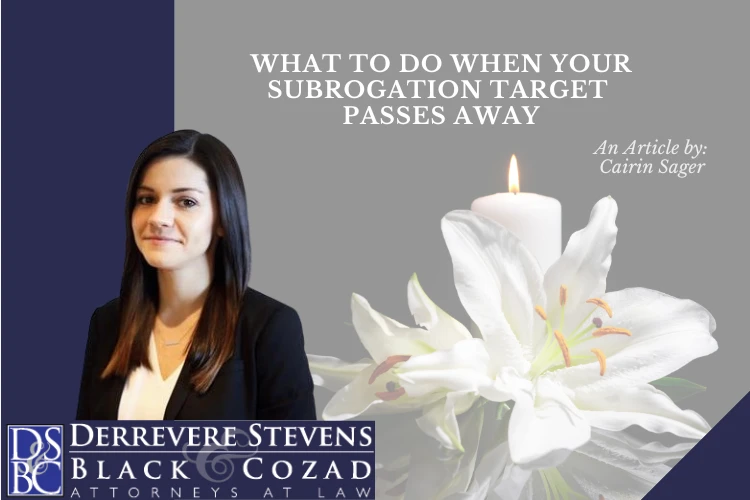What to Do When Your Subrogation Target Passes Away

Subrogation is the right of an insurance company to be repaid the money they spent on an injured policyholder while their personal injury claim was pending. The compensation comes from the insurer of whoever is held responsible for the accident. In the event that there is no coverage, an individual can be pursued directly¹. As far as a typical subrogation claim goes, an initial step once a file is received is to identify the target or tortfeasor and pursue their insurance carrier or the individual directly. The unfortunate problem arises when, during the pursuit of recovery, the target passes away. Does the claim go void? Are all rights to pursuit and recovery barred due to the death? The answer is no and there is generally a clear path to continue the pursuit of recovery against the original target.
The questions then become: who do you pursue, how do you pursue them, and how do you deal with other potential claims arising from the action and death of the target?
From the bat, an insurer cannot succeed on recovery if the right to recovery was not present in the first place. That means that the target you are pursuing needs to be the clear tortfeasor in the action. Second, you need to make sure that there are no coverage issues under the policy. That is, if there is a policy in place for the target at the time of the loss. It is generally best practice to run some sort of program, which varies by preference and firm, to identify the correct target at the beginning of a subrogation claim. Programs like idiCore, PeopleMap, and Court searches are generally helpful. When someone passes, it is helpful to run a similar search again in order to confirm the death and potentially help identify the estate.
With the unfortunate passing of an individual, the sum of their assets, legal rights and interests, and entitlements to property less all liabilities are put into an estate and given to a designated individual². So now, all the property and assets have shifted to their estate. Procedurally, the estate then becomes the target of the subrogation claim. This practice is generally accepted across the board. Further, death does not void a subrogation claim. The individual may have had insurance coverage at the time which allows for the pursuit of their carrier directly, even following the death of their insured. This will not change the subrogation procedure when negotiating and settling a claim. Should a carrier or individual refuse to pay the subrogation claim, a suit can be filed against their carrier, if available, or the individual. Running an appropriate search on the deceased individual as mentioned above, will avoid a potential evidentiary issue in litigation and ensure the identification of the right person and estate.
Once the estate has been identified, timing is important in the pursuit of the subrogation claim. While deadlines for subrogation claims vary by state, they tend to be on a shorter timeline due to the turnaround in probate. This is important to look out for to ensure that your subrogation claim stays valid.
When a person passes and their rights, interests, and property are transferred into an estate, there may be various claims attached to the estate, so it is important that you state your subrogation claim early and establish a claim as a creditor against the estate. The trustee of the estate will then become the appointee and bear the authority to distribute any and all estate funds to creditors and beneficiaries. However, several issues can arise when there is a subrogation claim amongst others against an estate. The good news is that creditors hold priority over the beneficiaries of an estate, meaning that they get paid out before the estate passes to the beneficiaries. When it comes to various creditor claims, however, subrogation claims may be lower on the priority list when it comes to payouts. Certain claims for medical and funeral costs are typically some of the first to be paid out. This is an important consideration when pursuing a subrogation claim and setting expectations for recovery.
Further, probate court rules, while they vary from state to state, bear clear rules and deadlines that are important to consider. Most states require an estate to go through probate relatively quickly following a death³. It is, therefore, important to analyze and make your subrogation claim quickly to avoid losing out on recovery on your claim. In addition, when analyzing the likelihood of recovery on your subrogation claim, it is important to note that certain types of property do not go through the probate court, and therefore would not allow for recovery on your subrogation claim⁴. For example, a jointly held property where there is a right of survivorship (triggering automatic entitlement to the other party), proceeds from a life insurance policy, and property held in a trust created by the deceased party, are all not passed through probate. This is because these types of property are automatically passed to another person by law. This can limit the recovery and is dependent on the deceased target’s assets, interests, and legal rights.
There will be cases where there is no estate. Unfortunately, in the pursuit of recovery on a subrogation claim, this is another hurdle to consider and overcome. Fortunately, it does not mean your claim is now void and there is no opportunity for recovery. Depending on your state, there are instances in which a subrogating attorney can open an estate in the target’s name in which to pursue recovery on their subrogation claim. As with any legal proceeding, there are procedural hurdles, expenses, and uncertainties to be considered when taking this action.
Overall, it is always important to weigh options and analyze the strength of your claim when pursuing an estate. Sometimes, the deceased may not have enough assets to create an estate that will produce recovery on your claim. Subrogating attorneys should always consider the multitude of factors in pursuit of recovery on a claim, especially with the added layer of a target passing away and pursuing an estate.
¹ https://www.cd-lawyers.com/blog/2021/may/how-subrogation-could-affect-your-pi-claim/



